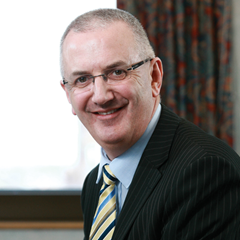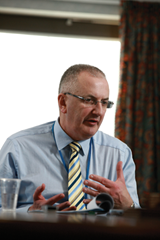Danny Kennedy interview: finding a way
 Tuition fees and the Budget are dominating Danny Kennedy’s workload four months into his term as Employment and Learning Minister. Peter Cheney asks the Minister about his plans.
Tuition fees and the Budget are dominating Danny Kennedy’s workload four months into his term as Employment and Learning Minister. Peter Cheney asks the Minister about his plans.
“All that I ask is that we have an open and honest and mature debate on this,” Kennedy says of the tuition fees dispute. At this stage, Kennedy wants to “set the scene accurately” so that everyone involved knows the challenges.
These are indeed challenging times for Stormont’s newest minister as he moves money from higher education to services dealing with unemployment, and works through his options for filling the gap.
The Bessbrook man’s own education started at his local primary school and continued at Newry High, where he now sits on the board of governors.
“I didn’t apply myself sufficiently at school and therefore I didn’t have the opportunity then of a university education,” he reflects. Instead, Kennedy went straight into employment with BT where he worked in administration and sales for 20 years. The company generously allowed him time to pursue his interests in local politics.
Kennedy may become one of the Executive’s shortest serving ministers, having been appointed on 27 October, but sees his time in office as a “fascinating opportunity”. The employment and learning brief, in his words, is “in the engine room” of both dealing with the current economic problems and preparing for the upturn.
“I’m a politician by instinct and conviction, and I’ve tried to learn my brief and keep ahead of the issues as they are presented to me, and to have a full understanding of the work of this department,” the Minister explains.
Some observers do question the department’s purpose. It was carved out of the old Department of Education and Department of Economic Development; Richard Barnett’s 2009 review called for a single ‘economy department’.
This is a “a very superficial view of DEL,” he responds, “and certainly it may have been one that even I may have had previously, but now that I’m running the department I think it is different.” Pointing to the learning side, he thinks a clear separation is needed between school education and the later levels.
Priorities
Kennedy’s main priorities are his budget, in draft form at the time of interview, and protecting front-line services in further education, training and skills: “It is true that higher education has taken much of the burden of the efficiency savings but I think we can manage our way through this.”
That said, no issue on his desk has had a higher profile than the future of university funding. Although the change is driven by a Conservative-led UK Government, Kennedy is not embarrassed by his party’s links to the Tories.
Most people, he contends, understand that Northern Ireland’s overall financial situation that Northern Ireland is “not unlike the rest of the UK” or indeed the Republic, continental Europe and the USA.
“These are not just purely party-political issues. These are of a wider economic importance and clearly the circumstances we find ourselves in are not ideal,” Kennedy remarks. “What we’re determined to do is find a way through.”
The higher education budget must save £68 million over the next four years, under the department’s draft spending plan. Our neighbours are dealing with similar shortfalls.
English universities can charge students up to £9,000 per year from September 2012, up from the current £3,290. Northern Ireland’s tuition fee cap is currently at that lower figure. The Welsh Assembly Government has followed England but will subsidise Welsh students studying anywhere in the UK. Scottish students study for free at home, but non- residents must pay £1,820 per year.
Kennedy and his officials have looked closely at the Welsh and Scottish models and he has spoken to each of his counterpart ministers in Great Britain.
Wales and Scotland, he points out, attract a large number of English students who can be charged a higher level of fees. Northern Ireland “does not have that luxury” as external students were historically put off for economic reasons or because of the province’s reputation during the Troubles.
He planned to bring an options paper to the Executive by the end of February, before starting a 12-week public consultation in March. The new Assembly would then take the final decision “presumably in June or early July.”
It is put to him that more could be done to offset that shortfall. More money could be found in DEL’s current expenditure budget; its lowest point is £767.4 million in 2012-2013. Universities could also seek out more European funding, as Reg Empey suggested.
A balance, he replies, must be struck between three different factors: affordability, standards and participation.
“Our guiding principle has to be that it remains not a rich man’s club but places should be available on the ability to learn, not the ability to pay,” he states. It is also “reasonable for those who benefit” from higher education “to make a contribution”.
Northern Ireland’s universities have a world class reputation, which Kennedy is keen to protect. Savings are necessary and institutions are therefore uneasy about how this will affect that reputation and the services they provide.
The province also has the best record in the UK for widening participation i.e. bringing students from poorer backgrounds into higher education.
If the province’s fees stayed low and some English universities charged the highest possible rate, there could be a “surge of students” into the province which could displace local students.
Widening participation was perhaps not so important, it was put to him, as young people can progress in further education as well. The Minister thinks that further education will increasingly be a “very real option”, indeed a cheaper option, and students can ultimately achieve the same outcome as in higher education.
“We can and we will use that as a key selling point,” he adds.
Positive
Separately, Northern Ireland’s latest unemployment rate stands at 8 per cent, for 2010’s last quarter. His response is measured, finding the figures “slightly disappointing and concerning”.
Extra demand on job centres and re-skilling programmes will increase the department’s costs.
“Yes, it adds pressure but we’ve got to try and work our way through those,” he reflects.
As a Minister, Kennedy describes his main aim as “trying to make a positive difference” with a focus on improving the performance of all areas within his brief: “Ultimately to serve on behalf of the wider public in the better interests of everybody in Northern Ireland.”
In conclusion, he is “really enjoying the challenge that has been given to me”.
Kennedy pays a strong tribute to his predecessor and describes the post as “a huge responsibility but it is also a huge honour for me to serve”.
Lessons from North Carolina
Northern Ireland is learning from a southern US state which leads the way in linking education and the economy.
On a visit to North Carolina in early February, Kennedy was impressed by its “very strong commitment and attachment to education” at all levels and the system’s strong collaboration with businesses.
Industry tells the education system where it needs skills (e.g. potential sectors for job creation), which can then be matched to qualifications. This “absolutely key” approach is being rolled out here through the assured skills programme, which aims to have a ready workforce when foreign direct investment is signed up.
Profile: Danny Kennedy
Born in 1959, Danny Kennedy is married with two sons and one daughter. A UUP member since 1974, he was a councillor for Newry and Mourne District Council’s Fews area for 25 years (1985-2010). He represented Newry and Armagh in the Northern Ireland Forum (1996-1998) and has been an MLA for the constituency since 1998. He has contested three general elections: 1997, 2005 and 2010.
Danny has chaired the Education and OFMDFM Committees and was Reg Empey’s deputy leader in the Assembly. He was also the UUP’s nominee as Justice Minister last April. Outside politics, he is Clerk of Session at Bessbrook Presbyterian Church, a member of Tullyvallen Silver Band, and a keen Arsenal and Northern Ireland fan.






